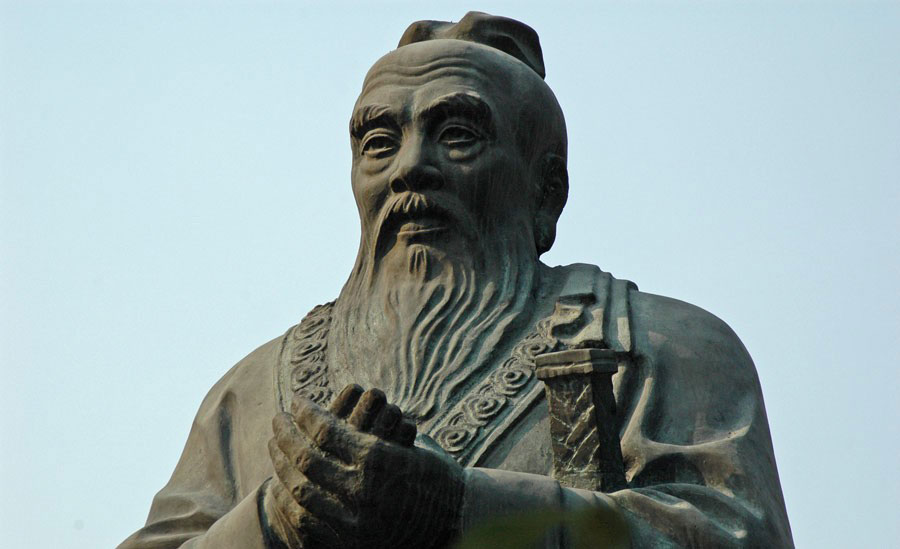This is an autobiography of Confucius. There were three stages in Confucius life, first stage begins on learning (age 15) and establishing oneself (age 30) in the world. Second stages consolidates and refine one’s life until there is no internal doubt (age 40) and one knows one’s role in the world (age 50). The results were that Confucius was at peace with the world (age 60), and arrived at internal freedom without crossing the morality line of what is right and wrong (age 70).
The Master said, ‘At fifteen, I set my mind on learning.
-> studying classics, to learn about the laws of the society and the universe.
At thirty, I stood firm.
-> established goal of life, and stood firm on it.
At forty, I had no doubts.
-> about himself and the world.
At fifty, I knew the decrees of Heaven.
-> he was clear about what the universe had arranged for him, and could feel and align with by moment.
At sixty, no sound irritates me.
-> he was able to embrace the world without internally getting irritated.
At seventy, I could follow what my heart desired, without transgressing what was right.
-> with morality firmly established and practiced within himself, he was able to live life freely without committing wrong.
Autobiography of Confucius – Discussion:
This chapter brings out the characteristics of a Chinese scholar and practitioner, which requires a life-time of dedication. It took Confucius himself 15 years of learning before he found and established his position in the world; another 10 years before he was sure about his life beyond doubt. After mastering his mind, it took him another 10 years to establish a proper relationship and connection with the universe, and another 10 years before he could embrace all situations in the world. Confucius was truly a hero in personal development, who had dedicated his entire lifetime in the pursue of and practice of knowledge. He represented a role model that had affected practitioners for years to come.
Finally, he brought out the important relationship between freedom and morality: Elementary freedom seeks to live life selfishly without consideration of others, whereas advanced state of freedom is achieved without committing what is wrong for oneself or for the world. The acceptance of yet non-alignment to negativity is a common teachings among all major religions in the world. It would be an error to think that one could do anything to anyone under the name of freedom.
子曰、吾十有五而志于學 。
-> 学习经典,学习有关社会和宇宙的法则。
三十而立。
-> 建立人生的目标。
四十而不惑。
-> 关于自己和世界。
五十而知天命。
-> 他很清楚宇宙什么安排他,并能时刻的感应和遵循。
六十而耳順。
-> 他是能够接受世界而不生气。
七十而從心所欲、不踰矩。
-> 道德已牢固的树立并实践在生活之中,能在不违反道德的情况下自由自在的生活。
* * *
讨论:
这是一个从孔子本人的自传。孔子一生有三个阶段,第一个阶段开始学习(15岁),在世界上建立自己的(30岁)。第二阶段巩固和完善自己的生活,直到有没有内部的疑问(40岁)和知道个人在世界上的位置(50岁)。结果是,孔子能和平的接受世界(60岁),和在没有违反道德的情况下体现自由(70岁)。
本章的特点,一个中国学者的实践,是需要一生的努力和奉献的。孔子花了15年的时间学习,才能确立他在世界上的地位,再过10年,才能肯定他的生活。再过10年,才掌握个人与的世界的关系,再过10年,才能平安的接受世界的所有情况。孔子是一个真正的英雄,在个人发展,他的整个一生就奉献在追求和实践知识之中。他是追求和实现学问的人的榜样。
最后,他带出了自由和道德之间的重要关系:初级的自由是自私,并不会考虑别人; 高级的自由,根孔子一样,能在不犯错的情况下体现自由。世界主流的宗教都提倡接受但不跟随负面。如果我们认为,可以在自由的名义下做任何的事情(包括负面的事情),这将是一个大的错误。


Leave a Reply